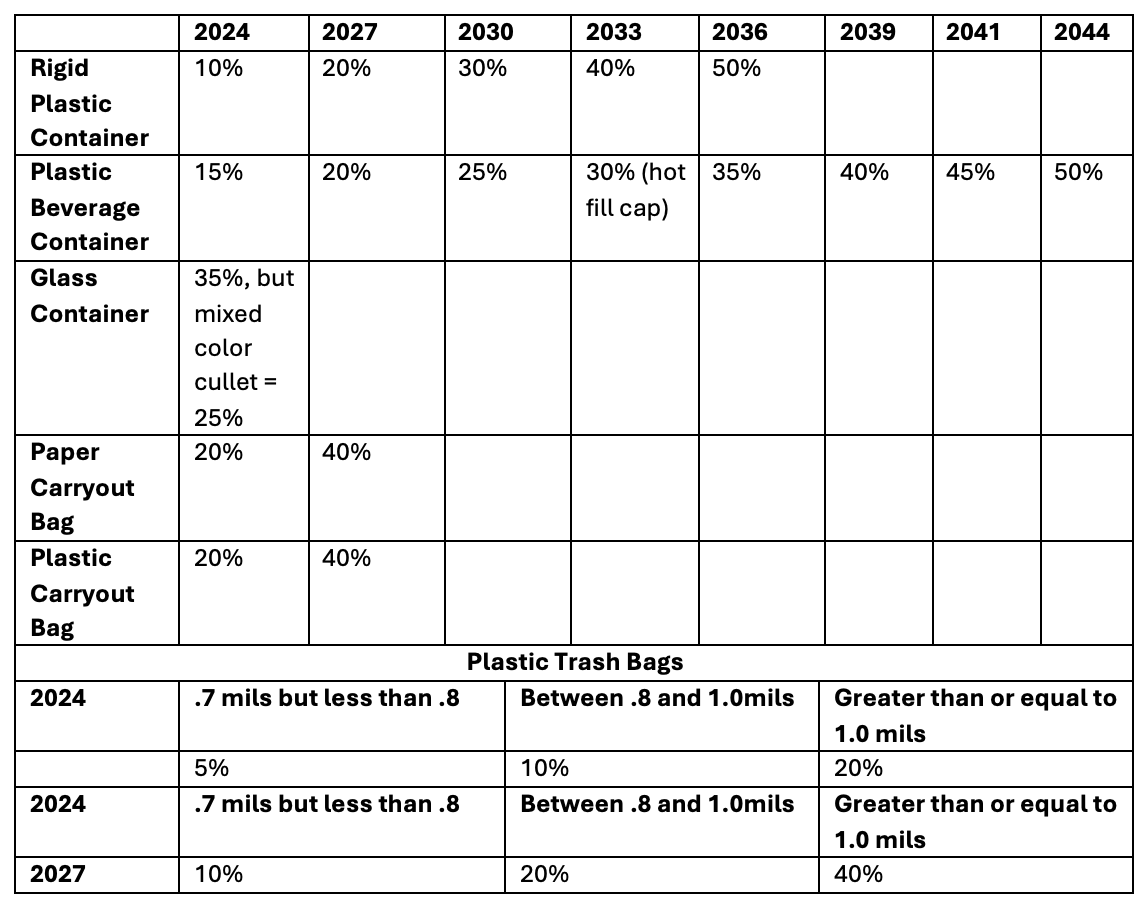In 2022, New Jersey enacted its new Postconsumer Recycled Content Law (N.J.S.A. § 13:1E-99.135 et seq.) (the “PRCL”), which requires manufacturers, “brand owners”, importers and/or distributors of certain plastic, paper and glass packaging to utilize increasing portions of postconsumer recycled content (PRC). The law’s recycled content requirements went into effect on January 18, 2024. The PRCL imposes substantial new reporting and compliance requirements across industries in an effort to institutionalize sustainability in manufacturing and product design. Though the law’s substantive requirements went into effect in 2024, the PRCL’s first reporting and compliance period will run from September 1, through December 31, 2025. Companies subject to these obligations must be prepared to timely comply with any reporting and/or compliance requirements.
The law applies to “manufacturers” of rigid plastic containers, plastic beverage containers, glass containers, paper carryout containers, plastic carryout bags, and plastic trash bags (collectively, the “regulated containers”); however, there are a broad range of companies that might be considered “manufacturers” under the PRCL. “Manufacturer” is defined to include 1) producers or generators of the regulated products; 2) a “brand owner of a product that is sold or offered for sale in [New Jersey] and that is packaged in a [regulated container], unless the brand owner identifies a licensee who agrees to accept responsibility . . .”; or 3) absent a person subject to New Jersey’s jurisdiction under categories 1 or 2, an importer or distributor of a product sold in New Jersey that is packaged in a rigid plastic container, plastic beverage container, or glass container. The statute expressly excludes from its scope persons that “at a single physical location” product, package, and sell products directly to consumers “at retail”, including but not limited to grocery stores, restaurants, bars, cafes, food trucks or carts, or the like.
Persons subject to the act are required to comply with phased minimum percentages of PRC in rigid plastic containers, plastic beverage containers, glass containers, and both paper and plastic carryout bags. PRC threshold requirements began in 2024 with 10% for rigid plastics and 15% for beverage containers, ramping up to 50% across most categories over the next two decades. Beverage containers bear a separate ramp schedule, beginning with 15% in 2024 and reaching 50% by 2044, with hot‑fill products capped at 30%. Trash bags face tiered requirements based on film thickness, while paper and plastic carryout bags under must each contain at least 20% recycled content. The PRCL’s phased requirements are summarized in the figure below:
The law contains certain exemptions, both temporary and permanent. Containers and packaging that contains food, except plastic beverage containers or glass containers containing beverages, are temporarily exempt from the PRCL’s requirements for five years. Refillable or reusable rigid plastic containers, as defined in the statute, are permanently exempt from the PRC requirements under certain circumstances. Packages containing milk products, plant-based products “with names that include the names of dairy foods such as ‘milk’”, medical food, food for special dietary use (as defined in 21 U.S.C. § 350), and infant formula are permanently exempt from the PRCL’s requirements.
In addition to these phased content thresholds, the PRCL prohibits the sale of polystyrene loose fill packaging, commonly known as packing peanuts.
Companies subject to the act may pursue a waiver, though at this time the grounds for such waivers are limited to three narrow categories. A manufacturer may be entitled to a waiver if it demonstrates in writing that technological barriers; supply shortages; or conflicts with other state or federal laws, rules, or regulations inhibit its ability to comply with the PRCL’s thresholds. Though the law allows the New Jersey Department of Environmental Protection (NJDEP) to establish additional bases for waivers, the agency has not done so to date. Waivers apply for no less than two years.
Failure to comply with New Jersey’s PRC requirements can result in steep penalties, including but not limited to administrative penalties between $1,000 and $25,000 for each violation; each day of a violation constitutes a separate offense.
New Jersey’s law reflects a broader regulatory trend. According to the Plastics Recycling Information Center, as of August 2024, five states have enacted mandatory PRC requirements for plastic packaging. Compared to requirements in other states, New Jersey’s standards are rigorous: California’s AB 793 mandates 15% PRC in plastic beverage containers starting in 2022, rising to 50% by 2030, while Washington’s SB 5022 mandates similar thresholds on a slightly delayed timeline. New Jersey’s approach is broader, targeting a wide range of packaging materials under one piece of legislation.
New Jersey’s annual compliance certification requirements begin in 2025, and NJDEP’s registration and compliance period will be open from September 1 through December 31, 2025. If you have questions about whether the law applies to your products or whether you are subject to the PRCL’s reporting and compliance obligations, please contact author Larry Silver at lsilver@lssh-law.com or author Luke Dodge at ldodge@lssh-law.com.
Our next article will explore how compliance is calculated, reported, and enforced, and discuss the law’s potential interplay with federal preemption and interstate commerce concerns. Stay tuned!

